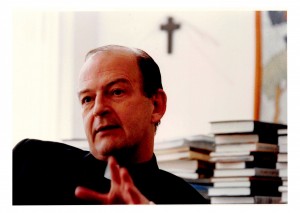
Two part series published on Coming Down to Earth blog at Patheos.com
Part 1
Part 2
Why We Went into Iraq and Should Have Stayed There — Part One
Published by Michael Novak on February 24, 2015
More than once in the last couple of years others have continued criticism and even insisted that I apologize for being in favor of the Iraq War in 2003. There are very strong moral reasons why the United States went into Iraq in 2003, and why it was strategically sound to do so (despite the wise caveats of many experienced leaders, most notably Pope John Paul II). Because the pope had publicly described me as one of his half dozen lay friends around the world, and because I loved him, it was exceedingly difficult, and painful, for me to put our friendship at risk.
As I said many times in those days, I was glad our pope opposed even the hint of a Muslim-Christian religious war. I was also glad our president recognized the moral and strategic duty to halt Saddam Hussein’s many violations of the peace treaty he signed in 1991.
In 1990, after Saddam Hussein boastfully and violently invaded Kuwait, a coalition of thirty-nine nations formed to remove Saddam’s forces from that small country.
That phase of the war ended swiftly in early 1991. U.N. Security Council Resolutions obliged Iraq to meet certain stringent conditions, including providing a list of all locations where it housed chemical weapons and allowing U.N. inspections of those sites, as well as the establishment of no-fly zones over certain Shiite parts of southern Iraq and the Kurdish zone in the north.
Over the next ten years, alas, Saddam Hussein’s violations of the truce escalated. The U.N. continued issuing formal resolutions warning him to stop. Saddam thought these threats meaningless and pressed on.
An inventory of Saddam’s weapons was prepared, and he was obliged to keep records as he destroyed them. U.N. inspectors began discovering, however, that stores of botulin, sarin, anthrax, and mustard gas had disappeared. As U.N. Chief Weapons Inspector Hans Blix told The New York Times in November 2002, “The production of mustard gas is not like the production of marmalade. You’re supposed to keep some track of what you produce.” There was no reliable account of what was where, and no satisfactory documentation of the weapons’ destruction was submitted.
Then on September 11, 2001, nineteen Middle Eastern terrorists hijacked four airplanes, their tanks full for transcontinental flights, departing from three major U.S. cities. As we and our friends all watched in horror, the first plane crashed into the North Tower of the World Trade Center, and then the second into the South Tower, with fuel tanks exploding on impact into huge, orange fireballs. The towers collapsed, floor by floor, with office workers and many brave firemen inside.
Once again, a large international coalition formed, this time to shut down the campsites in Afghanistan where legions of future terrorists were training. Most of Afghanistan was liberated quickly. The cruel and violent Taliban were driven into the southern Himalayas. Al-Qaeda leader Osama bin Laden fled with them.
Bin Laden disappeared into the mountains, but with the more habitable parts of Afghanistan liberated, the bulk of the American forces was about ready to leave. Meanwhile, video began emerging from Iraq, showing not only the use of chemical weapons on Shiite villages in the south, but also various poisonous gasses used on animals for experimental purposes.
When I was in Rome in early 2003, Italian military intelligence briefed me on weapons of mass destruction (WMDs) being prepared in Iraq. Everyone already knew of short-range missiles aimed at Israel, so I assumed the WMDs consisted of the arsenal of chemical weapons inventoried after the war of 1991.
During the Clinton administration, we learned of expanding new capacities and methods for terrorists to commit mass destruction using chemical and other biological agents. Defense Secretary Cohen warned of the possible deadly release of small but potent amounts of chemicals in public transportation systems. And after September 11, 2001, no U.S. president could ignore Saddam Hussein’s apparent interest in such weapons. The man sworn to protect and defend the United States had to confront an ugly fact: another attack on U.S. soil, executed by lone operators in one or more American cities at the same time, was not impossible.
Should the president imagine the likelihood as closer to 100 percent, or closer to 0 percent? Either way, no president could avoid a decision. Having experienced Saddam Hussein’s megalomania in Kuwait, and again in his repeated use of chemicals against Shiite villages in his own country and flagrant defiances of the U.N., how would you assign the probabilities? In my judgment, then as now, any president who did not act against Saddam Hussein would be held responsible for any further destruction in the U.S. by Middle Eastern terrorists.
But there are still deeper reasons why it was right and good for the allied coalition to liberate Iraq in 2003. We will review these in part two, to come.
Why We Went into Iraq and Should Have Stayed There – Part Two
Published by Michael Novak on February 27, 2015
The U.S. made huge mistakes after launching troops into Iraq in 2003. But the hugest mistake of all was getting out prematurely and immorally in 2011.
I am not interested in adjudicating the question of who is to blame for the pull-out. Bush, Obama, and the Iraqis themselves may all share responsibility. But that is beside the point I want to make.
At the time when we recklessly pulled out the defensive force of 50,000 that U.S. commanders determined to be the minimum allowable to maintain stability, the Second Iraq War had been won. After many mistakes and dead ends, violence had stunningly abated and stability had been won. A vibrant civil society had blown back to life. This stability was so surprising to many that Vice President Biden in early 2010 called it “one of the great achievements” of the Obama [!!!] administration.
As I noted in The American Spectator in 2007, victory left behind vast tangible benefits. Under Saddam, independent media had been banned. And yet in free Iraq after only three years there were fifty-four TV stations, 114 commercial radio stations, and 268 independent print organs.
With great bravery and under constant threats, Iraqi citizens carried out two free elections in succession. Iraq’s new constitution recognized religious liberties – not all such liberties, not sufficiently, but far in advance of the constitutions of many other Muslim countries.
Then, the unnecessary withdrawal of that residual force of 50,000 well-equipped and battle-hardened Americans left Iraq undefended against a future return of Al Qaeda – or, as events turned, an enemy far worse in size, ambition, bloodthirstiness, and massive cruelty: the Islamic State, ISIS. Without U.S. forces sufficient to provide a swift and deadly counterattack to drive ISIS back and into oblivion, that monster grew and keeps growing ever faster today.
ISIS announces its plans every day. It proposes a complete genocide of the Christian populations of the Middle East – through death (preferably by crucifixion), or through forced submission (dhimmitude), or conversion. The more public its announcements of military conquests to come, and the more ruthless (and unpunished) its public beheadings, the more voluminous its stream of bloodthirsty recruits.
Some writers have announced that persons like me, who supported the Iraq War in 2003, should be doing penance. Do they still not see that a premature departure of U.S. troops in 2011 cleared the way for an endless succession of cruel barbarians like Al Qaeda and ISIS, one after another?
The souls of hundreds of millions of Muslims worldwide are being divided by pressures to return to the barbarism of the seventh century, and by heartfelt desires for peace, compassion, prosperity, and the protection of human rights. As one young group of Muslim guerrilla fighters in Africa (fighting a Taliban-like regime) told me ten years ago, “It cannot be that the rights of every other group in the world matter, but not human rights among Muslims.”
How, they asked, can we turn hundreds of millions of young single men from lives of nihilistic violence and destruction, toward lives of prosperity, freedom, and respect for the dignity and rights of all humans? Their own human rights have been abused for generations by tyrants and their various secret police forces. The human rights of Muslims have been among the most neglected in the world.
A German Middle East expert pointed out another social reality. Polygamy leads to millions of passionate young men living in loneliness and despair. No wonder they dream that paradise will bring seventy-two sloe-eyed virgins of their own – on condition that they die martyrs while killing infidels.
The issue in Iraq was never merely bringing Saddam Hussein to trial for his hundreds of thousands of crimes – dropping poison gas on whole communities, gruesome tortures, horrific prisons. The greatest issue of all was changing the life prospects of Muslim young people, especially young males. All over the world, young males commit the majority of acts of violence and destruction. For some decades now, two-thirds of all military violence on earth has occurred among Muslim males of various factions. As many historians report, this wave started gathering force long before World War II.
For several valiant years, despite serious mistakes and failed strategies, the Allied Coalition finally grabbed the attention of young Iraqis and their leadership, who began to turn in a new and constructive direction.
Then our government abandoned those brave citizens who risked their lives to build a dignifying and prosperous democracy. We abandoned them, unprotected, to the tender mercies of ruthless nihilists. That was an awful betrayal.
It was a betrayal, too, of all those American heroes who gave their lives and limbs so that Iraqis might live with dignity and freedom.
And so now, in 2015, what should we do? Just surrender to ISIS? Just sit back and wait for still more violent and blood-lusting young men to attack the world, wave after wave? Shall we just stand by as all the Christians of the Middle East are exterminated? That does not seem to me the Christian or the brave thing to do. Certainly not the resolute course of action worthy of our creative and dynamic ancestors.


![presidencia.gov.ar [CC BY-SA 2.0 (http://creativecommons.org/licenses/by-sa/2.0)], via Wikimedia Commons Read more: http://www.patheos.com/blogs/michaelnovak/2015/03/pope-francis-and-the-three-sided-system/#ixzz3UvCnTyA8](http://static1.squarespace.com/static/58e66dba3a04113f8d9d6cf4/58e6725285c5bd1f9b74a540/58e6732d85c5bd1f9b74d171/1491497773176/Pope_Francis_in_March_2013-300x300-150x150.jpg?format=original)








